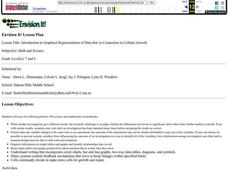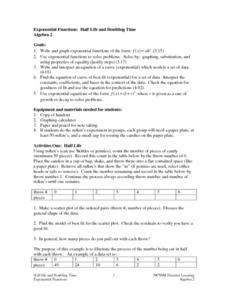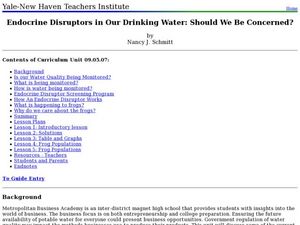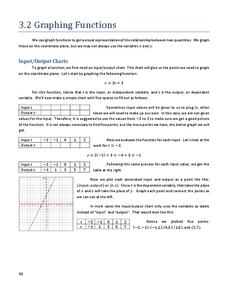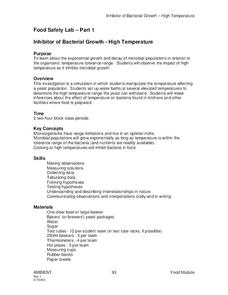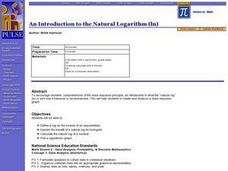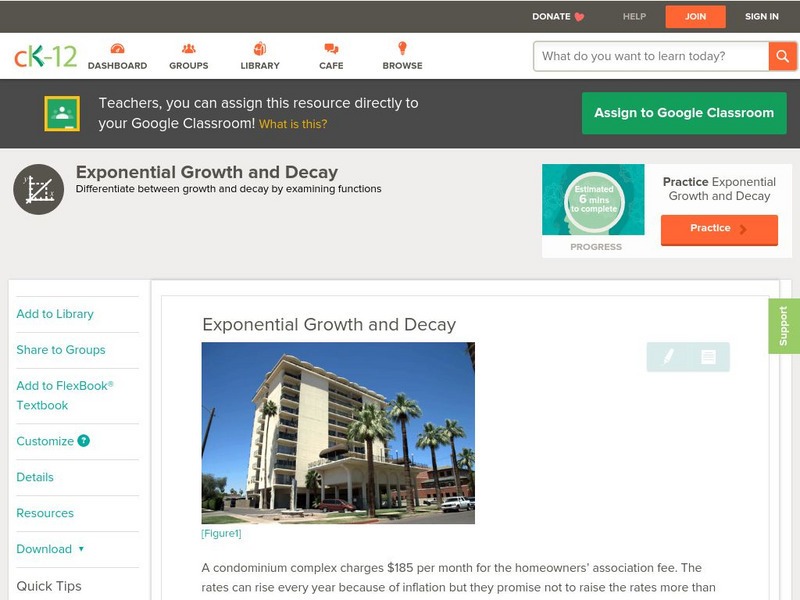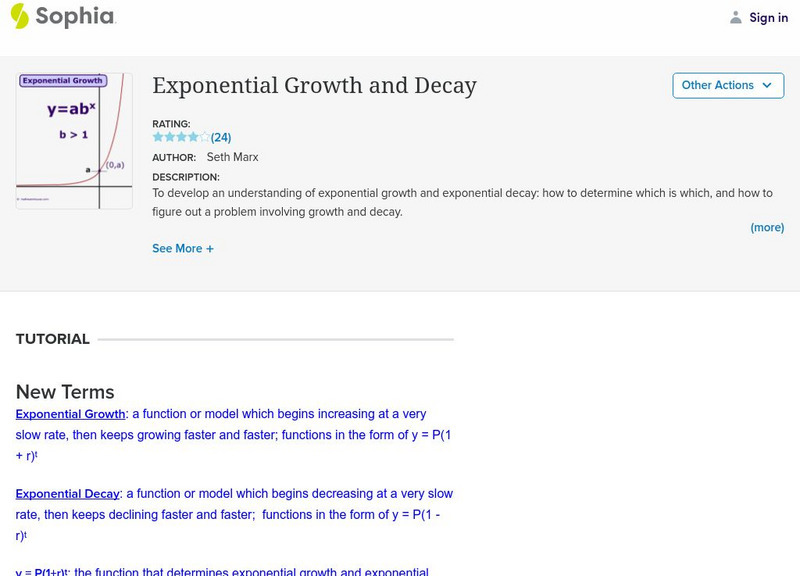EngageNY
Percent Rate of Change
If mathematicians know the secret to compound interest, why aren't more of them rich? Young mathematicians explore compound interest with exponential functions in the twenty-seventh installment of a 35-part module. They calculate future...
Curated OER
Will Exams Be Cancelled?
If the flu outbreak continues, exams will have to be canceled. Investigate the properties of exponential and logarithmic functions. In this algebra lesson plan, students use the TI to examine and differentiate between exponential growth...
Curated OER
How Much Data is That?
Students differentiate between exponential and logarithmic functions. For this algebra lesson, students use logarithmic properties to solve equations. They identify growth and decay of graphs.
Curated OER
An Introduction to Functions
Students investigate the growth and decay of an exponential function. In this algebra instructional activity, students apply properties of exponent solve problems. They identify any patterns they see in the graphs.
Curated OER
Introduction to Graphical Representation of Data Sets in Connection to Cellular Growth
Students practice graphing relationships between variables by studying topics such as exponential growth and decay. They conduct a series of numerical experiments using a computer model and a variety of physical experiments using mold,...
Curated OER
Exponential Functions: Half Life and Doubling Time
Pupils investigate the concept of exponential functions and how they increase in size over time. They simplify the functions in order to find the solutions that are possible and perform analysis of the curved line that is produced when...
Achieve
Spread of Disease
Viruses can spread like wildfire, and mathematics can model the speed of infection. Given a function, scholars analyze it to describe the spread of a disease within a stadium. Learners find the initial number infected and the maximum...
Curated OER
Endocrine Disruptors in Our Drinking Water: Should We Be Concerned?
Students investigate the different hormone contaminants in the water supply. For this math lesson, students analyze data tables and graphs. They demonstrate exponential growth and decay using frog populations.
Curated OER
Graphing Functions
In this graphing functions worksheet, learners write functions in logarithmic and exponential forms. They evaluate logarithms and determine the inverse of a function. Students graph functions. This six-page worksheet...
Curated OER
Carrying Capacity of Ecosystems
Students define population and carrying. In this algebra lesson, students explore exponential growth and decay based on animals and things that grow or decrease exponentially. They graph their findings and discuss their results as they...
Curated OER
Oodles of Poodles
Students solve equations by graphing. In this algebra lesson, students differentiate between functions and relations. They use the TI to graph their equation and analyze the graph.
Curated OER
Food Safety Lab
Students determine the optimal living conditions for yeast and apply these results to microbes in food. In this microbiology lab instructional activity, students observe the reaction of yeast to elevated temperatures. They relate these...
Curated OER
Purchasing A Used Car
Seventh graders investigate the practice of purchasing a used car with the help of links and resources found in the lesson plan. They conduct research to find the right kind of car using a variety of resources. Students examine data in...
Curated OER
An Introduction to the Natural Logarithm (ln)
Students explore the dose response principle, an introduction to what the "natural log" (ln) is and how it behaves. They create and analyze a dose response graph.
Curated OER
Reciprocals of Quadratic Functions
Eleventh graders investigate inverse functions. In this Algebra II lesson, 11th graders use their prior knowledge of linear, exponential,and quadratic functions to create a graph of an equation they have never seen before.
Varsity Tutors
Varsity Tutors: Hotmath: Practice Problems: Exponential Decay and Growth
Eleven problems present a variety of problems working with various aspects of exponential decay and growth. They are given with each step to the solution cleverly revealed one at a time. You can work each step of the problem then click...
Khan Academy
Khan Academy: Algebra I: Exponential vs. Linear Growth Over Time
Practice analyzing the end behavior of two functions that model similar real-world relationships, where one function is exponential and the other is polynomial. Students receive immediate feedback and have the opportunity to try...
CK-12 Foundation
Ck 12: Algebra: Exponential Growth and Decay
[Free Registration/Login may be required to access all resource tools.] Distinguish between exponential growth and exponential decay.
Sophia Learning
Sophia: Exponential Growth and Decay
The tutorial explores exponential growth and decay. Definitions, formulas, and example problems are included in the learning resource.
Texas Instruments
Texas Instruments: Pearson Prentice Hall Algebra 2: Exploring Exponential Models
Students will model exponential growth and model exponential decay. Students will make a visual choice of an appropriate model and then use the Transformation Graphing App to confirm their choice.
University of Guelph
University of Guelph: Physics Tutorials: Exponential Growth and Decay
Good site explaining exponential growth and decay, with questions for students to test themselves.
Math Planet
Math Planet: Algebra 1: Exponential Growth Functions
An exponential function is a nonlinear function that has the form of y=a*b^x, where a != 0, b > 0. An exponential function with a > 0 and b > 1, like the one above, represents an exponential growth and the graph of an...
Khan Academy
Khan Academy: Graphing Exponential Growth & Decay
Graph exponential functions. Students receive immediate feedback and have the opportunity to try questions repeatedly, watch a video or receive hints.
Vision Learning
Visionlearning: Exponential Equations in Science: Growth and Decay
Definition of exponential equations and an explanation of how they relate to science.






